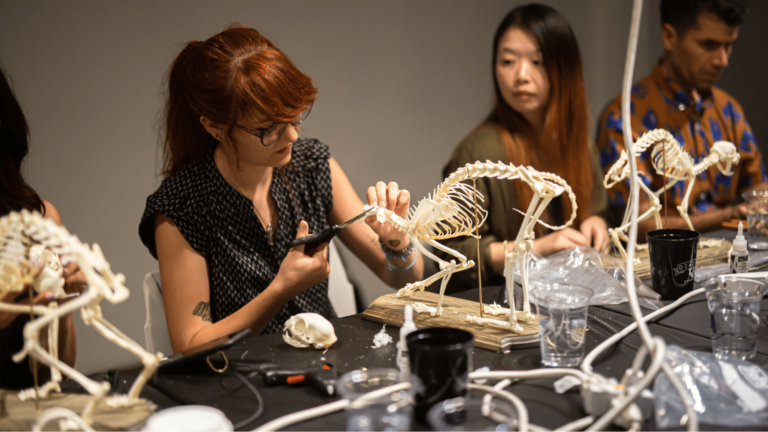Whether in-personal or virtual, workshops are an increasingly popular type of event that’s not going anywhere soon.
Want to learn how to make hand-rolled pasta from scratch while drinking a crisp glass of white wine? Book a workshop at the local Italian restaurant.
Feeling a bit flat and want to learn some new self-love techniques? Book a meditation and healing workshop that serves kombucha on tap.
At Eventbrite, we support a community of event creators who’ve hosted all kinds of successful workshops, from cooking and comedy classes to resume-building workshops.
In this article, we’ll share what some of our top event organizers are doing to host extremely effective workshop events. We’ll also provide a step-by-step workshop planning template to help you focus on what matters most: running workshops well.

Why workshops require a unique event planning strategy
Workshops rely on two main elements: the tangible value you offer and the environment you create.
Successful workshops should focus on creating a personal and intimate experience that caters to each event attendee’s needs. While your audience is smaller than hosting a concert, for example, this can be more challenging since all eyes are on the workshop leader and there’s a more attentive requirement.
Attendees seek to learn new skills in a supportive setting, stepping out of their comfort zones. Successful planning fosters an environment that encourages creativity and confidence.
But having strangers around you while performing something new is not an inherently comfortable position to be in. After all, many feel vulnerable doing something new in front of others. Social media platforms can exacerbate this by increasing how much people compare themselves to others.
For example, Sip ‘N Stroke needs to make sure everyone is comfortable at their fun and cheeky classes like their nude painting workshops or paint and dance parties. By making the event a party with fun music and a lively atmosphere, they can help people relax and embrace the challenge.
When planning an event, you can strive to also create a space of acceptance as they do. It’s less about just teaching the skills and more about building an environment where anyone can feel at ease and not be afraid to make mistakes along the way.

The ultimate workshop plan: an 8-step guide
Bringing your idea to life may seem daunting — after all, there are many steps involved in planning a workshop. However, the process is much simpler when you break it down. Here are the steps you can take to plan out your future workshops and maximize the number of event registrations you get:
1. Identify your target audience
Determine who your event is for, depending on what type of workshop you’re offering. By finding the right audience, you can determine how to market to them, when to hold the workshop, and what to focus on. That could mean looking at your own past attendees and researching what went well in past workshops or checking out who is attending others’ workshops in the area.
Using Eventbrite’s Facebook integration, you can target different audiences that are likely to be interested in your event. Facebook does this work for you, by identifying three audience segments with good potential:
Saved (also known as core) Audience: With Facebook’s interest data, you can target people who expressed interest on Facebook in your posts and similar posts or events.
Custom Audience: By installing the Facebook pixel on your website, you can target people who have visited your website.
Lookalike Audience: If you want to tap a new audience or compare audiences against each other, Facebook can use a data source, such as website visitors or previous ad clicks, to target people who have similar characteristics to those who have visited your website or interacted with your ads before.
You can also take a look at people who have created events with similar workshops to see if you can target lookalike audiences to theirs.
💡Pro tip: Struggling to find an audience close to you? Try attending a similar workshop in your area and see for yourself who’s in the rest of the class! This undercover mission could give you a better understanding of who the local audience is.
Want to target your niche audience?

2. Set the time and duration
The length of a workshop depends on several factors, including the content and format. Below are a few examples to help you perfectly time your workshop:
- Half-day workshops last 3–4 hours and are best suited for introductory or overview workshops.
- Full-day workshops last 6–8 hours and are appropriate for training or in-depth sessions.
- Multi-day workshops take place over several days and are suitable for extended training or intensive workshops.
Determine the length of your workshop by breaking it down into each activity and estimating its duration. Allocate plenty of time for late arrivals, setup, discussion time, and feedback from attendees. Plan in added time for new workshop attendees, as they might ask more questions and require more guidance.
Be sure to tailor your workshop’s time and duration to your audience. Avoid overlapping with school hours for students, and consider attention spans and energy levels for families with young children.
💡Pro tip: Planning your time carefully will make it easy for you to craft an accurate agenda. Then, you can hand out an event program for your workshop’s participants and even include useful resources for them to follow up on what they learned in preparation for your next workshop.

Shop Made in DC / Wine and Watercolors / Washington, DC
3. Determine the format
Will your workshop be an interactive session, roundtable, or demonstration? Whether it’s an in-person workshop, a virtual workshop, or a hybrid workshop, these formats are adaptable to your needs.
- Interactive sessions involve conversation, discussion, or activities to help participants learn and engage with the content.
- Roundtable sessions usually consist of a panel of experts who discuss topics with the audience in an informal setting.
- Demonstration sessions involve explaining how a process or technique works and includes examples.
💡Pro tip: Think about which format would best help your audience learn and understand the content you’re presenting. Choose a format appropriate for the topic, number of people in attendance, and experience level.
Interactive sessions are great for hands-on skills that everyone can try out, whereas demonstrations might work better for more complicated processes that take expertise. Roundtable sessions fit workshops that discuss more strategic or conceptual topics like The University of Arizona Center for Innovation’s commercialization strategy workshops.
Market your upcoming workshop!

4. Account for the worst-case scenario
Remember Murphy’s Law: Anything that can go wrong, will go wrong. While we can hope that won’t be true for your event, it’s best to be as prepared as possible in your workshop preparation.
Consider having backup plans for these worst possible outcomes to keep your event running smoothly even if anything unexpected arises. Create action plans for replacing workshop content, such as workshop facilitators not showing up or technology not working on the event day.
💡Pro tip: Not every problem will be solvable. Some of your backup plans might involve canceling or changing the date of your event, and that’s okay. Just make sure you have a plan to do that as efficiently as possible while communicating clearly with your would-be attendees to make sure they aren’t too upset with the outcome.
5. Choose the right venue
Select a location that’s convenient for guests and has the necessary accommodations and equipment, as well as adequate space to suit the number of guests and any furniture/equipment required.
A “must-have” list of venue requirements will help you settle on and set up the right space. When vetting venues, consider whether your workshop requires elements like:
- AV support
- Wi-Fi
- ADA-compliant restrooms
- Kitchen access
- Space for physical exercises
Keep in mind your venue’s location, based on your target audience research. You want to choose a space your target attendees can get to! Ideally, your chosen venue will include the furniture you need, but you may have to bring your own. If so, consider how achievable it will be (flights of stairs, access, etc.).
Don’t be afraid to think outside of the box for unique venues either! Unusual event venues are more popular than ever, and they can bring added value to an event by providing a special atmosphere and interesting resources.
💡Pro tip: One way to find interesting event venues is by searching for different workshops on Eventbrite and looking at where they’re hosted. They don’t even have to be similar workshops to yours — just the prompt of where others are hosting in your are can get the creative juices flowing!

6. Ask your audience what they want to experience
Ask people what they’d like to do and experience. Reach out to past attendees or ticket holders to find out their interests and what they haven’t seen before.
Before the event happens, consider having your online community vote via a poll on your social media channels. Or, if you have a mailing list, take advantage of tools like Eventbrite’s email marketing platform to send out an email questionnaire. You can even create an event hashtag or social media contest and have prospective attendees make social media posts with suggestions.
💡Pro tip: Incorporate interactive polls into social media to encourage potential attendees to share what they want to experience out of a workshop. This might focus on the food and drink or activities included. You can also reach out to past attendees for their feedback on what went well and what improvements you could make. It’s important that your activities meet your audience’s preferences, and the only way to know is to ask them.
7. Create a budget
Money is a huge part of workshop planning and requires you to have a clear budget that you can dissect into different needs because you, ultimately, want to make a profit.
Consider the following aspects when creating a budget:
- The price of your workshop
- Equipment hire
- Staff costs (hosts, team leaders, assistants, etc.)
- Venue hiring
- Marketing materials (social media advertisements, press releases, etc.)
- Catering
Use a budget template to guide your calculations, but actually estimating the costs will require some elbow grease on your part. Input each item you spend and the total cost into the template to stay on track.
💡Pro tip: If you’re struggling to find accurate cost estimates, reach out to a range of vendors, suppliers, and venues to ask for quotes. Focus on a competitive pricing model to not price yourself too low or high. You should also keep in mind the cost per person based on the price of the ticket to ensure you’ll make a profit.
8. Promote your workshop
To get people through the door, you’ll need to invest in event promotion.
One way to know where to invest your marketing budget is by asking past workshop participants how they heard about the events they attended. Use analytics to track what platform attendees made their purchase, too. That can be a good starting point to figure out how to focus your next outreach.
If this is your first time planning a workshop, consider the best way to find people looking for a workshop like yours. For example, promoting the event on relevant social media pages or through social media ads could be a great way to find people with similar interests.
💡Pro tip: To target your audience as accurately as possible, use Eventbrite Ads. With Eventbrite Ads, you can put your workshop at the top of the search results when people look for similar events in your area.

How to bring your workshop to more people
Turning your workshop idea into a reality takes hard work.
From choosing event venues to appointing facilitators, it’s easy to get lost in the sea of responsibilities, but sticking to our workshop planning checklist will help you stay on course.
Once you’re done with your event preparations, you’ll want to bring it in front of that target audience. One great way to do that is with Eventbrite Ads.
Because Eventbrite is the most popular events search engine in the world, putting an ad on searches for events like yours ensures that you’ll be in front of a large number of highly interested potential attendees.






